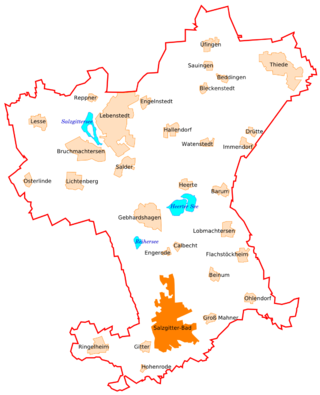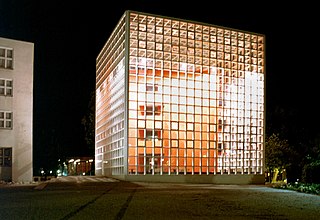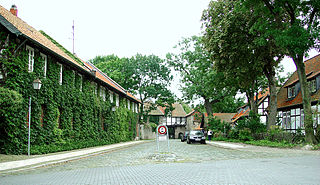
Braunschweig or Brunswick is a city in Lower Saxony, Germany, north of the Harz Mountains at the farthest navigable point of the river Oker, which connects it to the North Sea via the rivers Aller and Weser. In 2016, it had a population of 250,704.

The German Federal Bureau of Aircraft Accident Investigation is the German federal agency responsible for air accident and incident investigation.

The Mittelland Canal, also known as the Midland Canal, is a major canal in central Germany. It forms an important link in the waterway network of the country, providing the principal east-west inland waterway connection. Its significance goes beyond Germany as it links France, Switzerland and the Benelux countries with Poland, the Czech Republic and the Baltic Sea.

Holzminden is a town in southern Lower Saxony, Germany. It is the capital of the district of Holzminden. It is located on the river Weser, which at this point forms the border with the state of North Rhine-Westphalia.

Volkswagen Halle is an indoor sporting arena located in Braunschweig, Germany. The capacity of the arena is 8,000 people. It is currently home to the Basketball Löwen Braunschweig basketball team.
Stiebel Eltron is a company based in Holzminden, Germany, that manufactures central heating products such as heat pumps. The UK office was set up on the Wirral Peninsula in 2008. The company dates back to 1924 in Berlin, when Dr. Theodor Stiebel founded Stiebel Eltron. Today it is a green energy low carbon specialist manufacturing ground, air and water source heat pumps. It further produces ventilation and air conditioning and systems technologies. It has a worldwide turnover of €700 million and employs 4000 staff.

With a population of about 20,000, Salzgitter-Bad is the second biggest quarter of the German city Salzgitter in Lower Saxony. Salzgitter's name derives from it; the quarter is regarded as the historical and cultural centre of Salzgitter.

The Staatstheater Braunschweig is a theatre company and opera house in Braunschweig, Germany, presenting and producing music theatre, Tanztheater, theatre, Theatre for Young Audiences and concerts.

Ostfalia Hochschule für angewandte Wissenschaften, is a Fachhochschule in eastern Lower Saxony, Germany. The predecessor of the college, Staatliche Ingenieurschule Wolfenbüttel, was founded in 1928. It merged with two other independent institutions in August 1971.
The Green Power Forum was an English group created by companies in the renewable energy sector to assist organisations and businesses in becoming more energy efficient.

Brunswick Palace on the Bohlweg in the centre of the city of Brunswick, was the residence of the Brunswick dukes from 1753 to 8 November 1918.

The Braunschweig University of Art is the second largest fine arts college in Germany.

The Academy for Youth Leadership was a Hitler Youth (HJ) leadership school in Braunschweig. It was the highest Nazi training facility for the training of full-time junior executives for Hitler Youth during the Nazi era. It was built between 1937 and 1939. Today, the Braunschweig College for Adult Education and the Abendgymnasium Braunschwieig are housed in this building.

Wabe-Schunter-Beberbach is a Stadtbezirk (borough) in the north-eastern and eastern part of Braunschweig, Germany. The district is named after the river Schunter and its tributaries Wabe and Beberbach.

The Braunschweig tramway network is a network of tramways forming part of the public transport system in Braunschweig, a city in the federal state of Lower Saxony, Germany.
ICHIJO Homes is a construction company based in Sydney, Australia, that specializes in modular energy efficient housing. The company is an affiliate of ICHIJO.LTD in Japan.

The following is a timeline of the history of the city of Braunschweig (Brunswick), Germany.

Schloss Wolfenbüttel is a castle in Wolfenbüttel, Lower Saxony, Germany. An extensive four-wing complex, it originated as a moated castle (Wasserburg). It is the second-largest surviving schloss in Lower Saxony and served as the main residence of the rulers of the Principality of Brunswick-Wolfenbüttel from 1432 to 1753. It now houses a gymnasium secondary school, the Federal Academy of Arts Education, and a museum with its historic rooms on display. Its immediate vicinity is home to several historically significant buildings including the Herzog August Bibliothek, the Lessinghaus, the Zeughaus, and the Kleines Schloss.

The Helmholtz Centre for Infection Research (HZI) is a publicly funded research institute based in Braunschweig, Germany. HZI is a member of the Helmholtz Association of German Research Centres, the largest non-university scientific organisation in Germany.

















